Recognition and Ambivalence - (New Directions in Critical Theory) by Heikki Ikäheimo & Kristina Lepold & Titus Stahl (Hardcover)

Similar Products
Products of same category from the store
AllProduct info
<p/><br></br><p><b> About the Book </b></p></br></br>This book brings together leading scholars in social and political philosophy to develop new perspectives on recognition and its role in social life. It begins with a debate between Axel Honneth and Judith Butler, the first sustained engagement between these two major thinkers on this subject.<p/><br></br><p><b> Book Synopsis </b></p></br></br>Recognition is one of the most debated concepts in contemporary social and political thought. Its proponents, such as Axel Honneth, hold that to be recognized by others is a basic human need that is central to forming an identity, and the denial of recognition deprives individuals and communities of something essential for their flourishing. Yet critics including Judith Butler have questioned whether recognition is implicated in structures of domination, arguing that the desire to be recognized can motivative individuals to accept their assigned place in the social order by conforming to oppressive norms or obeying repressive institutions. Is there a way to break this impasse? <p/><i>Recognition and Ambivalence</i> brings together leading scholars in social and political philosophy to develop new perspectives on recognition and its role in social life. It begins with a debate between Honneth and Butler, the first sustained engagement between these two major thinkers on this subject. Contributions from both proponents and critics of theories of recognition further reflect upon and clarify the problems and challenges involved in theorizing the concept and its normative desirability. Together, they explore different routes toward a critical theory of recognition, departing from wholly positive or negative views to ask whether it is an essentially ambivalent phenomenon. Featuring original, systematic work in the philosophy of recognition, this book also provides a useful orientation to the key debates on this important topic.<p/><br></br><p><b> Review Quotes </b></p></br></br><br>This book brings together a diverse array of scintillating essays from some of the most important proponents and critics of recognition theory today. One pervasive theme is the <i>ambiguity</i> of recognition--its dangers as well as its indispensability to human life. In this respect <i>Recognition and </i><i>Ambivalence</i> implicitly makes Rousseau rather than Hegel into the true founder of recognition theory, while at the same time developing it in ways that illuminate such contemporary phenomena as racism, gender inequality, postcolonial domination, reification, and emancipatory social movements.--Frederick Neuhouser, author of <i>Rousseau's Critique of Inequality: Reconstructing the Second Discourse</i><br><br>This fascinating encounter between Judith Butler and Axel Honneth--accompanied by a terrific collection of critical essays--advances the theoretical conversation about the political valence of recognition, casts a clarifying eye on its past, and shows how much patient labor is required to achieve understanding across differences in philosophical approach and political perspective. Indispensable!--Patchen Markell, Cornell University<br><br><i>Recognition and Ambivalence </i>explores key issues regarding the merits and problems of considering the concept of recognition as a primary driver of critical social theory. By encouraging the contributors to think through the potential ambivalences, and negative impact, of such a focus, the editors have provided a uniquely valuable volume that facilitates a nuanced and qualified defense of critical recognition theory by taking us beyond the current debates that have engaged supporters and detractors.--Shane O'Neill, coauthor of <i>Recognition Theory as Social Research: Investigating the Dynamics of Social Conflict</i><br><p/><br></br><p><b> About the Author </b></p></br></br>Heikki Ikäheimo is senior lecturer in philosophy at UNSW Sydney. <p/>Kristina Lepold is junior professor of social philosophy and critical theory at Humboldt University Berlin. <p/>Titus Stahl is assistant professor of philosophy at the University of Groningen.
Price History
Price Archive shows prices from various stores, lets you see history and find the cheapest. There is no actual sale on the website. For all support, inquiry and suggestion messages communication@pricearchive.us


















